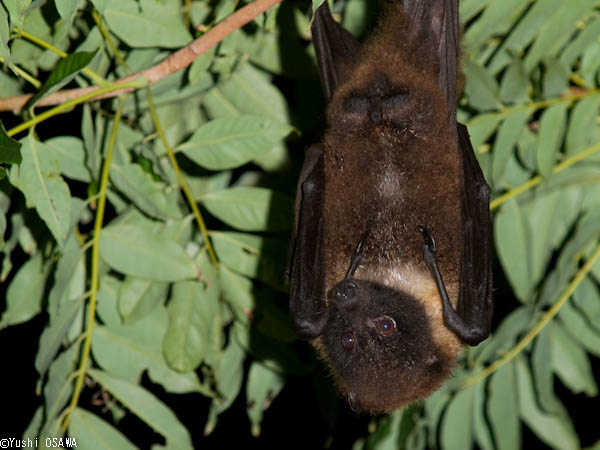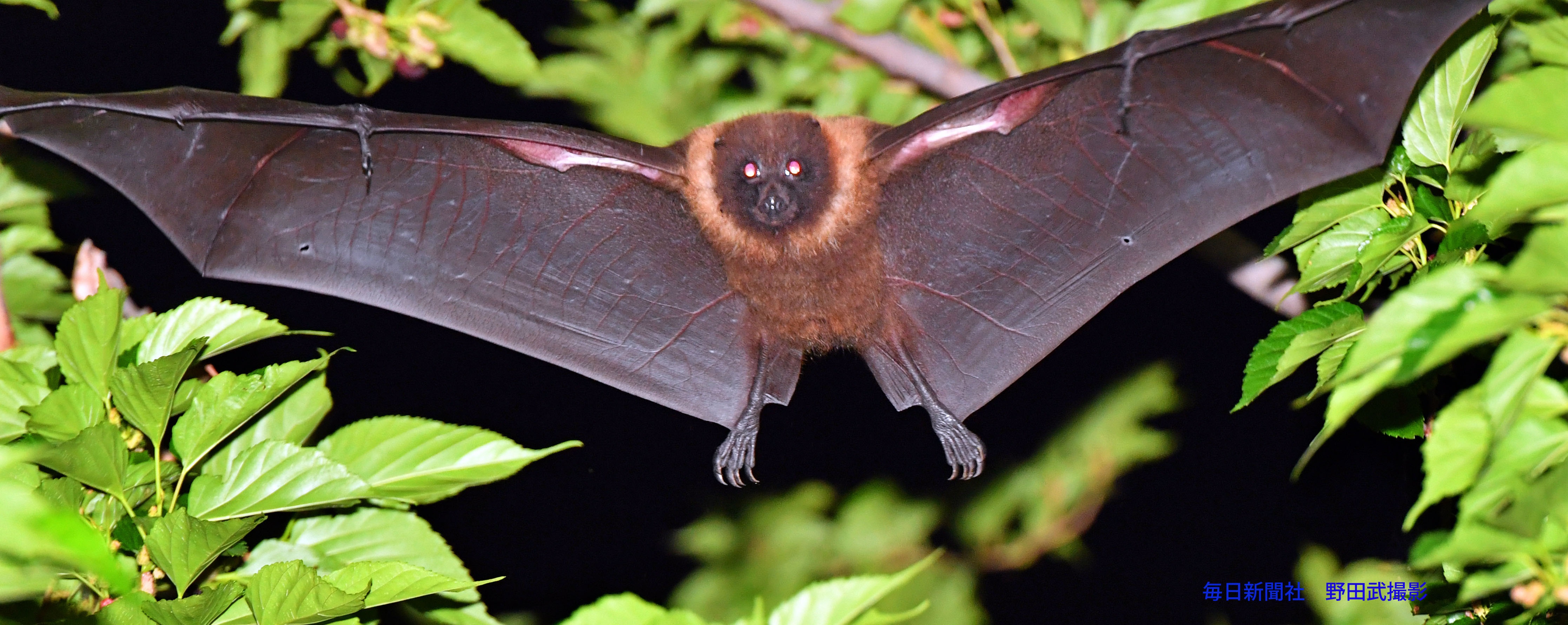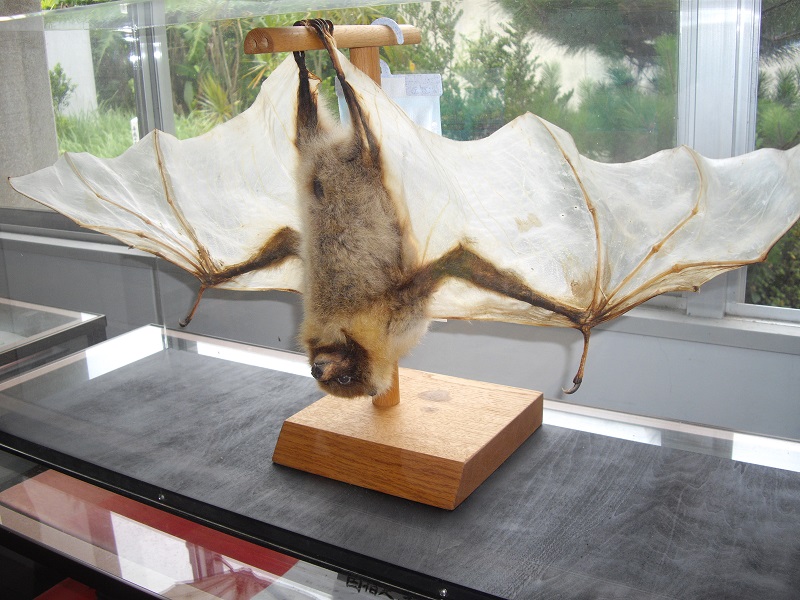travel guide of Kuchino-erabu island

891-4208 Kuchi-Erabu Island, Yakushima-cho
Flying-Fox
When you come to Kuchinoerabu-jima , please look up into the night sky.
Forty to fifty minutes after sunset, you may be able to see the huge Erabu
flying-foxes. They are often seen on Gajyumaru (Chinese banyan), Washington
palm, and Yama-guwa (Marus australis Poir.).
 Photo by Mr. and Mrs. Osawa
Photo by Mr. and Mrs. Osawa

Photo by Mr. T.Noda(The Mainichi Newspapers, May 2017)
Table The number of flying-foxes visiting fruit trees (in 2014)
|
Date |
Time period |
Place |
Number of flying-foxes |
Observation |
Moon age (days since last new moon) |
|
8Sept |
23:50- 24:00 |
Palm trees at school plaza |
0 |
15 |
|
|
5Sept |
21:55- 22:05 |
Palm trees at school plaza |
0 |
12 |
|
|
31Aug |
18:30- 21:00 |
Palm trees at school plaza |
3 |
50 flying-foxes flew over the tree. |
7 |
|
13July |
0:15 -0:20 |
Peach tree at Yamaguchi’s vegetable garden |
1 |
16 |
|
|
12July |
2:30-2:35 |
Inu-biwa (Ficus erecta Thunb.) at the Yamaguchi |
1 |
15 |
|
|
18-25June |
around 21:00 |
Gajyumaru (Chinese Banyan tree) near Yukei-Inn |
10 |
Flying-foxes had stopped to visit after fruit was dropped by rain fall |
|
|
18June |
around 20:00 |
Peach tree at Ohyama’s vegetable garden |
10 |
20 |
|
|
13June |
21:30 |
Peach tree at gas station |
1 |
15 |
|
|
13June |
3:25-3:35 |
Palm trees at school plaza |
0 |
15 |
|
|
13June |
3:10 |
Peach tree near Yukei-Inn |
3 |
15 |
|
|
10May |
22:00 |
Yama-guwa (Mulberry tree) at Power plant |
6 |
10 |
|
|
9May |
19:50 |
Yama-guwa (Mulberry tree) at Power plant |
3 |
|
9 |
|
9May |
19:40 |
Chinese banyan trees at north of power plant |
4 |
|
9 |
|
9May |
20:45- |
Palm trees at school plaza |
6 |
9 |
|
|
8May |
22:15 |
Palm trees at school plaza |
1 |
|
8 |
|
8May |
19:30-21:00 |
Palm trees at school plaza |
5 |
5 flying-foxes visited on Palm trees between 19:39-19:55. |
8 |
|
7May |
21:40-21:50 |
Palm trees at Kenkou plaza |
0 |
3 heads flew over the tree. |
7 |
|
7May |
21:20 |
Palm trees at school plaza |
0 |
7 |
|
|
30Apr |
23:45 |
Palm trees at Kenkou plaza |
6 |
30 |
|
|
30Apr |
23:20 |
Palm trees at school plaza |
14 |
30 |
|
|
7Apr |
20:05 |
Palm trees at school plaza |
1 |
7 |
|
|
29Mar |
19:30 |
Palm trees at school plaza |
0 |
29 |
|
|
27mar |
23:35 |
Palm trees at school plaza |
6 |
27 |
Table Pellets dropped under fruit trees (2014)
|
Date |
Place |
pellets dropped under tree | Moon age |
|
2Sept |
south slope at Kanamine shrine | Maruba-gumi (Elaeagnus macrophylla, leaf) |
8 |
|
21Aug |
south slope at Kanamine shrine | Maruba-gumi (leaf) |
25 |
|
28July |
south slope at Kanamine shrine | Maruba-gumi (leaf) |
1 |
|
19July |
south slope at Kanamine shrine | Maruba-gumi (leaf), Tabunoki (Persea thunbergii) |
22 |
| 13June | north slope at school | peach, Inu-biwa(Ficus erecta Thunb.), Chinese Banyan, Tabunoki (Persea thunbergii) | 15 |
| 13June | near gas station |
peach |
15 |
| 13June | south slope at Kanamine shrine | Maruba-gumi (leaf) |
15 |
| 8May | south slope at Kanamine shrine | Maruba-gumi (leaf) |
9 |
| 29Mar | From north slope at school to Kanamine shrine | Inu-biwa (Ficus erecta Thunb.) |
28 |
| 27Mar | north slope at school | Gardenia jasminoides |
26 |
| 16Feb | south slope at Kanamine shrine | Maruba-gumi (leaf) |
16 |
What is Flying Fox?
The Erabu flying fox only inhabits the islands of Tokara and Kuchinoerabu-jima.
In February 1975, the flying fox was designated as a national monument.
In addition, it was designated as an endangered species in IA (CR), and
was entered in the Red Data Book of the Ministry of the Environment.

Erabu flying-foxes have dark brown bodies. Males have a yellow band on
their neck and females have a white band .
Erabu flying-foxes are nocturnal and rest during the day while hanging
from trees in the forest. Erabu flying-foxes rely on vision rather than
sonar to fly.
A short while after sunset, Erabu flying-foxes will fly to their feeding
grounds. They will eat fruit, leaves, nectar and bark (see the below tree
list*). After drinking the juice of fruit and leaves, they will spit out
the dregs (Pellets). They swallow some extent swallow soft things, such as bananas. They also occasionally eat insects.
* List of Trees, whose fruit and leaves Erabu flying-foxes eat.
| Gajumaru (Chinese Banyan, Ficus microcarpa L.f.) Akou (Banyan tree, Ficus superba Miq. var. japonica Corner) Yama-guwa (Marus australis Poir.) Inu-biwa(Ficus erecta Thunb.) Oitabi (creeping fig or climbing fig, Ficus pumila L.) Tabunoki(Persea thunbergii kosterm.) Maruba-gumi (Elaeagnus macrophylla Thunb.) etc. |